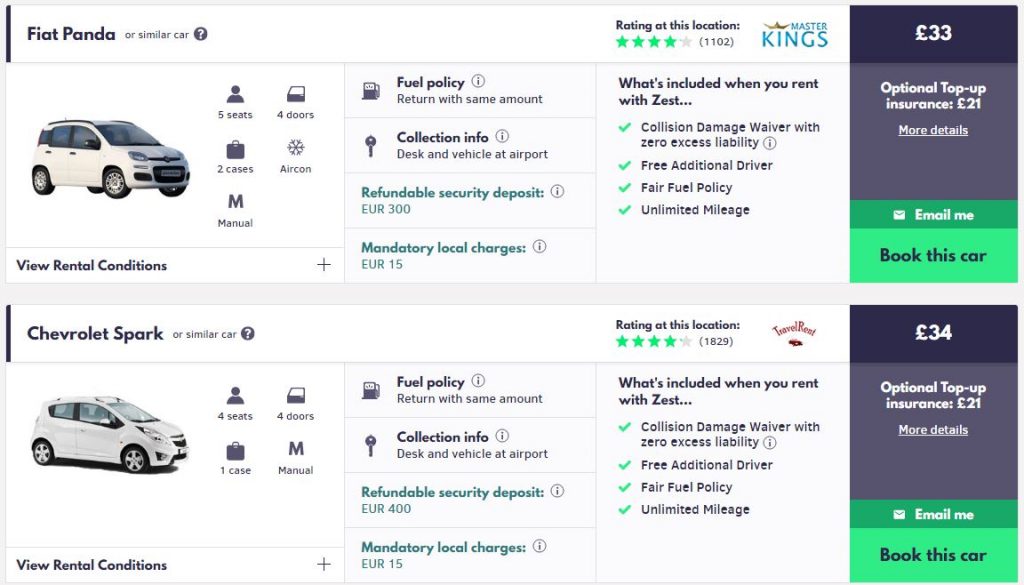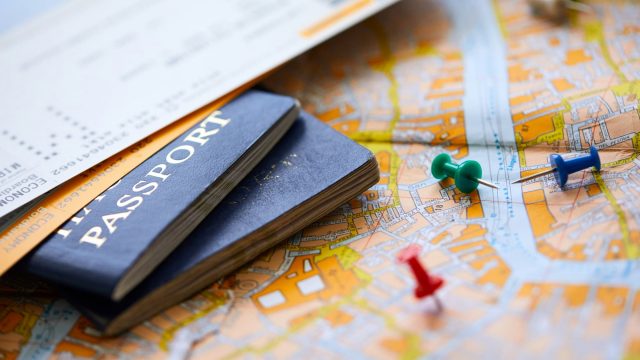*Updated 2022*
We try to ensure our website and booking process are as clear for our customers as possible. We know the car hire industry has a bit of a bad name when it comes to confusing terms or not being transparent and this is applicable to the cars themselves. Have you ever tried to book a hire car only to be completely bewildered when your vehicle is confirmed as a CDMR or a SWMR? That’s why we’ve explained car hire classes below.
On our search result screens we only show the following:
- Supplier’s name.
- Car type – picture & manufacturer (or similar).
- Important information – Fair Fuel Policy or Desk in Airport etc.
- How much luggage the car will roughly take.
- Price (including any free extras such as additional driver and built-in excess protection).

We believe this is the clearest way to display the information and makes comparisons easy. But what about the cars themselves?
Why don’t you specify diesel/petrol?
Rental car suppliers can’t always guarantee you’ll be given the exact vehicle model you booked. Our website will show where vehicles will have a diesel transmission. Where fuel is not specified, you will be given either a petrol or a diesel vehicle.
If you prefer a diesel vehicle, look for this in the description of the vehicle, as shown below, or filter the results accordingly.
Why haven’t I got the hire car I booked?
This is quite a commonly asked question throughout the car hire industry. Unfortunately, car hire suppliers can’t always guarantee a specific make or model of vehicle. When making a car hire booking, you’re booking a category of vehicle rather than a specific car. This can be because the suppliers may have alternatives in their fleet, the car may have been returned late or involved in an accident. This is why we mention “or similar car” next to each available vehicle. The car you are given by the supplier should always be of a similar size or specification as the one listed.
What does “or similar” mean?
When you book a rental car, companies will list a model to give an indication of the type of vehicle you’ll receive. You don’t book a specific model such as a Fiesta, instead you book a category based on the type of vehicle you want e.g. an estate or an MPV.
Let’s assume you book a “VW Polo or similar” but receive a Dacia Logan. According to SIPP (see below) a VW Polo and Dacia Logan are broadly similar and therefore interchangeable. It’s not saying they’re exactly the same.
Factors taken into consideration when categorising vehicles and grouping them together include size, number of doors, transmission, fuel, air conditioning, and luxury factor.
Brand reputation, engine size, top speed, torque, or looks are not taken into consideration.
What are ACRISS/SIPP codes?
The similarities of various cars are usually calculated by ACRISS. This is the industry standard for describing a hire vehicle in a few letters e.g. CDMR. It enables cars to be compared easily by grouping similar cars together.
Each letter describes something unique – the vehicle category, the number of doors, the transmission, and fuel & air conditioning.
| Category | Type | Transmission/Drive | Fuel/Air Cond |
|---|---|---|---|
| M Mini | B 2-3 door | M Manual Unspecified Drive | R Unspecified Fuel/Power with Air |
| N Mini Elite | C 2/4 door | A Auto Unspecified Drive | N Unspecified Fuel/Power without Air |
| E Economy | D 4-5 door | D Diesel with Air | |
| H Economy Elite | W Wagon/Estate | Q Diesel without Air | |
| C Compact | V Passenger Van | ||
| D Compact Elite | S Sport | ||
| I Intermediate | T Convertible | ||
| J Intermediate Elite | F SUV | ||
| S Standard | J Open Air All Terrain | ||
| F Fullsize | E Coupe | ||
| P Premium | |||
| L Luxury |
So, an XNMV would be a: Premium Elite, Roadster, Manual, Petrol car with A/C. Aston Martin Vanquish or Porsche 918.
Whereas an ECAQ would be an: Economy, 2/3 door, Auto, diesel car with no A/C. Sounds like a Fiat Punto or Nissan Micra to me.
It’s a simple system but some codes can be confusing. Code _C__ for example indicates a 2/4 door car. How can this be you ask? Well, you’re paying for a 2 door hire car but if there are no two-door vehicles from this category available, you’ll be upgraded to a 4 door which usually means more space!
Car description
Some suppliers will use a car description rather than SIPP codes to group vehicles. This is meant to make things easier for customers. A rough breakdown is as follows:
- Mini – E.G. Fiat 500, Citroen C1, Hyundai i10, Chevrolet Spark. Can usually accommodate 2-4 adults and 1 medium suitcase. As the name suggests this is a very small car. Although you could fit up to 4 adults in some, it might be a tight squeeze with all their luggage! They are best suited to one or two people, and usually have just two doors. With limited boot space your luggage will need to be minimal. However, the small engine size makes these cars very budget friendly. If you just need a car to whizz round the immediate area then these vehicles are perfect. They can also squeeze into nearly any parking space!
- Economy – E.G. Opel Corsa, VW Polo, Renault Clio , Toyota Yaris. An economy will usually have around 2-5 seats and can fit 2 medium size suitcases. Economy cars are perfect for anyone travelling on a budget due to their relatively low petrol costs. These are ideal for shorter trips and will be easy to park in smaller spaces. A perfect compromise between size and value!
- Small Family– E.G. Ford Focus, Opel Astra, VW Golf, Seat Leon, Mercedes A-Class. Can usually accommodate 4-5 adults and 3 medium suitcases. This type of car is a great choice for a family on a budget but best suited to shorter journeys. Whilst they can cope with longer journeys these cars are ideal for driving in city locations. They are easy to park and offer good fuel economy. Most of these cars feature air-conditioning but it is always best to check this in advance.
- Estate/Small MPV– VW Passat Estate, Ford Focus Estate , Opel Astra Estate, Skoda Octavia Estate . These will typically have 5 seats and will fit 3-5 medium suitcases. Great for golf clubs too. Perfect for family trips away, ideal for heading out to the beach with all your beach gear.
- Large Family– E.G. Skoda Octavia, Opel Insignia, Mercedes C-Class, Ford Mondeo, VW Passat. Can usually accommodate 5 adults, 4 medium suitcases. With the space of a saloon or estate-sized vehicle and a bigger engine, these cars can comfortably handle longer journeys without anyone feeling cramped. They typically feature more boot space so are well-equipped to fit extra luggage. Whilst specifying a vehicle with a diesel engine will slightly improve the fuel economy, a car with a petrol engine is still considered budget friendly. Air-conditioning usually comes as standard with these vehicles.
- People carrier/Large MPV– E.G. Opel Vivaro, Mercedes Vito, Renault Traffic, VW Touran, Ford Galaxy. Can usually accommodate 7 adults with 2-5 medium suitcases. These vehicles provide extra space and therefore extra leg room. They are ideal for larger parties and big families, or smaller groups travelling with extra luggage. With 7 seaters, the back seats can be folded down to make extra boot space if you require room for more than two suitcases. These vehicles are often a popular choice for long journeys as the extra space ensures everyone’s comfort. Bear in mind that with all available seat space taken, the boot space may be compromised.
- Executive– E.G. Audi A6, Mercedes E-Class, Nissan Maxima, BMW 5-Series. These vehicles tend to have more powerful engines and a more comfortable ride. These can usually seat 4 or 5 adults with up to 4 medium suitcases. Often seen as a more luxurious vehicle and the rental price will reflect this. Availability is often low so be sure to book in advance.
- Jeep/SUV– Nissan Qashqai, Renault Captur, Opel Mokka, Nissan Juke, Dacia Duster, Peugeot 2008. Typically better equipped for hilly and mountainous areas. Boot space can also be more roomy with a capacity for 3 or 4 suitcases. If unsure, please check available vehicles before booking. SUVs booked in America tend to be bigger than those found in Europe.
These categories aren’t set in stone and some firms use more terms. Just to make things a little more confusing, some suppliers use Group A, Group B, Group C to categorise their vehicles instead of the above car description method. You can filter your quote results on our website by car description (see image below).
Booking the wrong size vehicle will lead to either an incredibly frustrating game of life-size Tetris, trying to fit all your luggage inside, or you’ll be forced to pay for an upgraded vehicle (if there’s one available). This will be bigger and therefore will accommodate all your belongings, but it will add to the cost of your holiday.
Top tips
- Think about when you’re going. Heading to Cyprus at the height of summer? Make sure you’ve got A/C. Or if you want something fancier, get a convertible or SUV.
- Think about where you’ll be driving. Heading to Madeira? Think seriously about getting a more powerful car to deal with the hills. This is particularly important if there’s a group of you in one car.
- Size matters. It’s no good choosing the cheapest, smallest car if your luggage won’t fit – you’ll only have to pay for an upgrade at the desk. Likewise, don’t hire an SUV if there’s only 2 people with one suitcase between you. Check out this post for more information on hire car sizes.
- Count your pennies. Take your budget into consideration when deciding which rental car category to book. Think about the cost of rental and the fuel consumption the vehicle may need. The cheapest quote may not always be the most economical!
Understanding car hire classes
It can be a confusing system to understand, especially if you only hire a car every now and then. The secret is to think logically and work out what you need. Always remember that our helpful Customer Support Team is available for advice and guidance should you need it.
Secure your dream rental car with Zest!







I recently hired a car in Mallorca and although I had excess cover in the UK (about &49 for the year) I was told that if I was to rely on this cover I would have to make a deposit of 950 euros on my credit card. As I have only a debit card this was not an option so I had to take their cover at 20 euros a day. I paid and this was the only transaction I made in Mallorca that trip. From this point on I was unable to access my bank account although my debit card still worked. When I got home I found that someone had tried some 7 times to access my account but the bank had blocked access and I had to reset all the security when I got home. Coincidence? perhaps but a warning to me.
Dave Carless
Hi Dave,
We only work work with suppliers whom we completely trust to look after our customers. We’d also recommend that if you’re ever “forced” to take out additional insurance, you contact the broker to resolve the issue for you.
Kind regards
Mark
Economy Car Hire
I have been hiring cars with economy car hire for years in Malta, Portugal, Madiera, Spain, Majorca and the only place i always get issues is mainland spain. They are a night mare and insist you still have to take out their top up insurance or you will have to wait in a queue of incoming passengers to have your car checked at the end of the holiday. No time unless you want to miss your plane. WIsh this could be sorted
Hello,
The car supplier (Solmar) is not aware you (economy car hire) offer zero excess. They still pretend i will be charged for even minor scratches. This should should not be a matter of discussion between Solmar and myself at pick up time. Moreover at return time i may face additional delay as they need to inspect the car and the other customers (covered by Sollmar’s insurance) will be geven priority as in their case no inspection is needed.
Conclusion; a lot of frustration at pick up, a lot of time lost at pick up, uncertainty about delay at return time, uncertainty about coverage and consequences in case of damage.
Willy
Hi Willy,
We don’t actually offer Zero Excess with Solmar anymore. Your booking includes Excess Reimbursement Insurance (ERI) which means you would be charged an excess by Solmar but would then claim it back through the insurance. The end result is the same – there is no cost to you (unless the damage was caused by negligence). Full information regarding ERI can be found in the Terms & Conditions, on our website’s help section or by calling +44 1362 852288.
I apologise for any inconvenience caused and hope you have a great time in Spain.
Kind regards,
Mark
Economy Car Hire
I like many take advantage of a yearly car hire excess policy at a cost of approximately £45 for Euro cover. Why cannot the car hire companies or yourselves offer cover at a reasonable rate so that the car hire cost is fully included upfront? You or they could make a reasonable charge ,say built in to the price of £1.00 per day, and still make a profit.
Hi John,
Unfortunately, not every customer wants the same package or wants full cover if it will cost more. Lots of people take a gamble that they won’t have any issues. The Top Up insurance available through us costs £2.50 per rental day which we feel offers great value for money. If we could do insurance for £1 a day (and make a profit) we’d be very happy but I fear the insurance company wouldn’t last long.
The annual policies are great if you make frequent trips but for £45 to be cost effective versus the Top Up insurance, customers have to be renting cars for a minimum 18 days a year. Again, not everyone can do this.
Kind regards,
Mark
Economy Car Hire
Hi David,
Car hire firms need to be upfront about Insurance
every time I get to the hire desk they try to scare
the hell out of you with extras they say are not
covered for and try to add on £100.00 or more,
it needs sorting.
Kind regards
Mike
hi
do car hire have to provide breakdown cover as part of their rental agreement. thanks
Hi Brenda,
Suppliers have to provide a basic level of breakdown. But many charge for full breakdown assistance.
For example, when booking directly with some suppliers, the only time you will get ‘Free’ assistance is if the car has a mechanical problem that is not your fault. If the breakdown is as a result of an accident etc, you will be charged for assistance.
At the end of the day, the companies will all provide assistance, because they are not going to leave their car at the side of the road.
Kind regards,
Mark
Economy Car Hire
Thank you for the useful information. We regularly hire cars at Faro Airport, but some of the codes/descriptions were baffling! Much clearer now. We agree, that information explaining different types of insurance would be very useful.
Thanks! Very useful – and I agree with Dennis about car-hire insurance, Mark. It would be excellent to be able to understand exactly what is covered when renting a car.
Regards
Martin
Very informative. Try and explain insurance, and the other parts of charges made in the same understandable way.
Dennis Gell.
Hi Dennis,
Thanks for the feedback. I’m glad you found it useful and I’ll see what I can do about an insurance guide.
Kind regards,
Mark
Economy Car Hire
Great article, very useful for those who do not hire regularly and it definitely gives some key indications on what category to chose depending on the destination.
Very enlightning, but what does SIPP mean?
Hi David,
They’re technically Acriss codes but are known in the industry as SIPP. This stands for Standard Interline Passenger Procedures (yes I did have to look it up!).
Kind regards,
Mark
Economy Car Hire